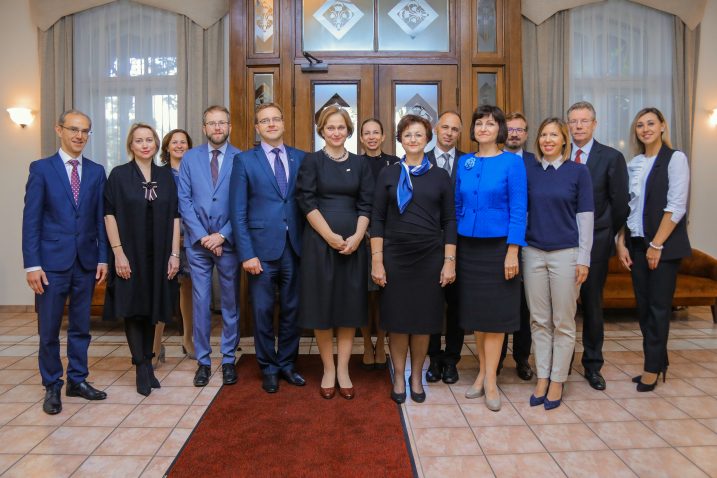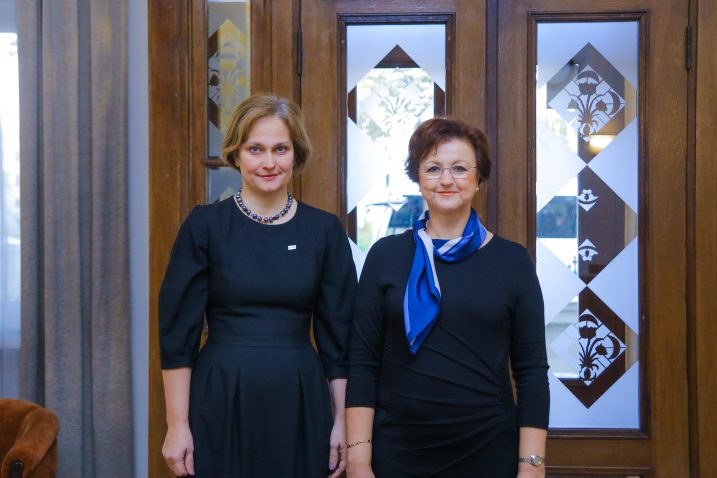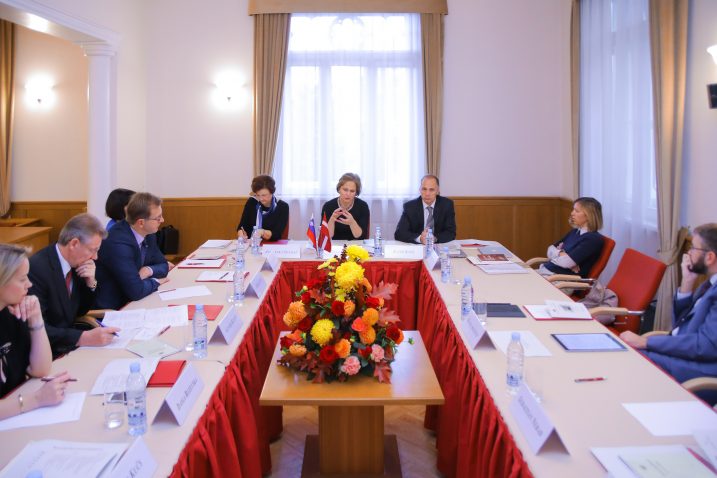The bilateral meeting between the Justices of the Constitutional Court of the Republic of Latvia and the Judges of the Slovenian Constitutional Court concludes
From 3 October to 5 October, the delegation of the Slovenian Constitutional Court paid an official visit to the Constitutional Court of the Republic of Latvia. The judges discussed the role of constitutional courts vis-à-vis global challenges and the relevant case law of the Courts.
During the first working session, the Justice of the Constitutional Court Daiga Rezevska provided an insight into the recent case law of the Constitutional Court. Namely, she presented the rulings on the reimbursement of the overpaid VAT (2017-12-01), restrictions on voting rights (2017-25-01), noise in moto and auto racing tracks (2017-02-03), the right of persons, who had been punished for severe crimes, to work as teachers (2017-07-01) and the refusal to initiate cassation legal proceedings in criminal procedure (2017-23-01).
Špelca Mežnar, the judge of the Slovenian Constitutional Court, shared the Court’s experience by presenting two cases heard by the Slovenian Constitutional Court linked to the freedom to express one’s religious beliefs among the supporters of the Islamic religion. In one of the cases, the Court examined the Slovenian regulation on festive days and official holidays in connection with the expression of one’s religious beliefs (U-I-67/14), whereas in the second case – the prohibition to slaughter animals in the way that is prescribed for acquisition of halal meat (U-I-140/14). The Judge Špelca Mežnar underscored that in both cases the Court’s reasoning had been based on, inter alia, the principle regarding the Slovenian traditions that was included in the Constitution.
During the second working session, the judges provided their views on the role of the constitutional courts vis-à-vis the global challenges. Matej Accetto, the Judge of the Slovenian Constitutional Court, in his presentation turned to the issue of the historical development of the legal system of the European Union and the ostensible juxtaposition of the constitutional courts and the Court of Justice of the European Union. He emphasized that, as for any international organisation, it was important for the European Union to receive the support of the Member States, which it tried to achieve by ensuring respect for human rights and respect for the sovereignty of the Members States.
Ineta Ziemele, in turn, underscored that challenges to the classical legal concepts, which we had been living with since the establishment of the modern state in the 19th century, became pronouncedly apparent in the European legal space. Namely, challenges to sovereignty, jurisdiction and privacy. In the context of European integration, it would be necessary to reach an agreement on the contemporary scope of these classic concepts, since united in diversity continues to be the leading motive for the integration process. The Constitutional Courts should play a major role in this process. She stated that the collision between the national law, the European law and the international law should be examined on case-by-case basis. To provide an insight in this, Ineta Ziemele mentioned as an example two cases heard by the Constitutional Court – the Border Treaty Case (2007-10-0102) and the Lisbon Agreement Case (2008-35-01), in which the Constitutional Court examined the issues of the sovereignty of the Latvian State in juxtaposition to the norms of the European and international law.
The working session concluded by a more extensive discussion, in which the judges discussed the models of constitutional review in both countries, the rulings by the European courts and the application thereof, and also shared their general reflections on the future of the European Union.
In conclusion, the President of the Slovenian Court Jadranka Sovdat emphasized that both Courts shared the same fundamental aim – reinforcing the rule of law and ensuring protection for human rights, therefore this format of bilateral cooperation was valuable and educative for both parties. Ineta Ziemele, in her concluding remarks, also highlighted the role of the constitutional courts, foregrounding their responsibility towards the particular society and in the context of globalisation, in general.
The final event of the visit was meeting the representatives of the President’s Chancery at the Riga Castle. During the visit, the guests were taken on a tour of the splendid premises of the Castle and provided an insight into its history.

The delegation of the Slovenian Constitutional Court with the delegation of the Latvian Constitutional Court. Photo: Aleksandrs Kravčuks.

The President of the Constitutional Court of Latvia Ineta Ziemele and the President of the Constitutional Court of Slovenia Jadranka Sovdat. Photo: Aleksandrs Kravčuks.

Photo: Aleksandrs Kravčuks.



